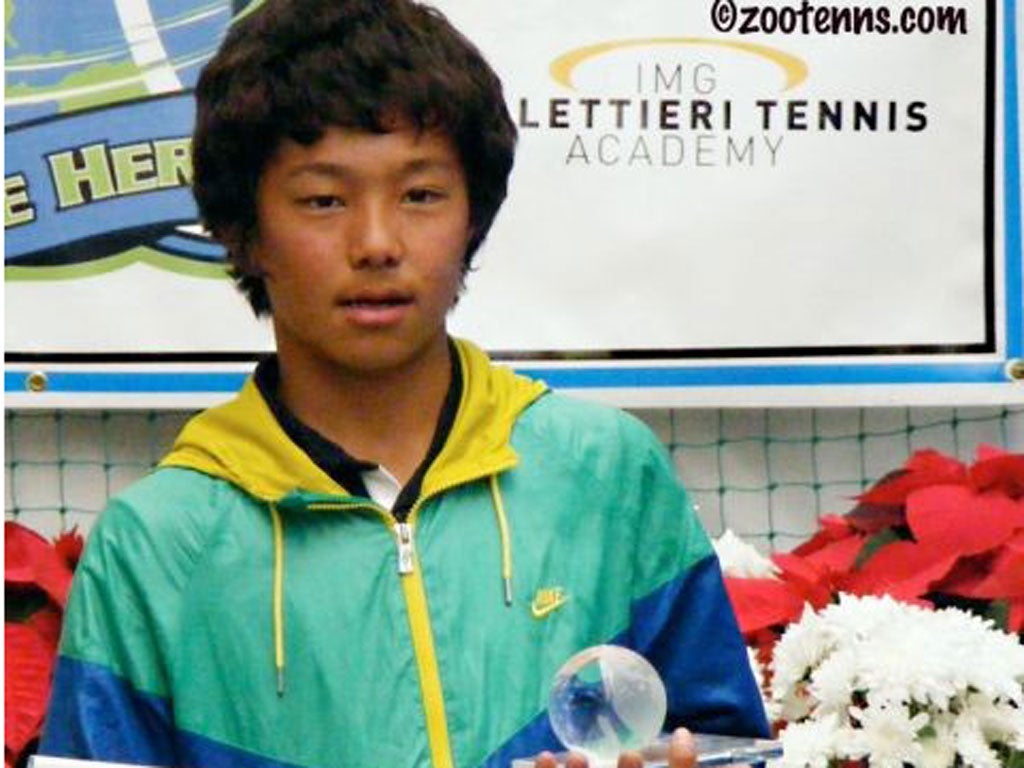Deaf teenager says disability can help him reach the top
14-year-old Korean junior Lee Duck-hee tells Paul Newman not being able to hear makes it easier for him to concentrate

Hearing the sound of the ball coming off your opponent's racket usually tells you a lot about its trajectory and the shot you will have to play next. Lee Duck-hee would not know about such things. The 14-year-old South Korean has been deaf since birth, which makes his progress in the junior game all the more remarkable.
Lee, who is one of the younger players taking part in the boys' tournament here at the Australian Open, lost 6-3, 6-3 to Chile's Christian Garin in the singles yesterday, but is reckoned to have a bright future. He has already won the Under-12 title at the Eddie Herr event in Florida, which is one of the world's leading junior tournaments, and qualified to play in his first Grand Slam event here. He has his sights on finishing in the world's top 10 in juniors this year and at senior level he wants to be world No 1.
"Actually, I don't care about my disability at any time, and on the court it's easy to focus on my match because I can't hear anything," Lee said yesterday through an interpreter, having lip-read reporters' questions. "I am really happy to be here for the first time. It's a really good opportunity to judge my ability against other players in the world. I am really happy and hope to be here next year again."
Lee, who refuses to make a big issue of his disability and was surprised at the media interest in him, said he prefers not to mention his deafness to opponents or officials, though it can cause problems. There were a number of occasions in yesterday's match when he was not aware that balls had been called out. Officials were not given specific instructions, but on several occasions Thomas Sweeney, the umpire, used hand signals to communicate his decisions.
"I do worry about that because today it happened a lot of times," Lee said. "The chair umpire already called 'wait', but I couldn't hear that, so there were a lot of lets. I wanted to see big [gestures] from the umpire during the match."
Although he cannot benefit from a crowd's vocal support, Lee claimed that not hearing anything made it easier for him to concentrate. Meanwhile his coach, Hoon Park-kyung, said he had developed a special relationship with him because of his deafness.
"Communication between players and coaches in Korea is usually quite simple because the players think that they should do what they are told," Hoon said. "I just wanted us to play together, not just teach him, but say small things."
Lee's hero is Roger Federer. He keeps on his phone a photograph of himself with Federer and Rafael Nadal at an exhibition event in Korea when he was eight. "Federer passed by in the hall yesterday and didn't recognise me," Lee said, his voice tinged with disappointment. "I was very disappointed. I really wanted to take a picture with him. Maybe I can in the future."
Join our commenting forum
Join thought-provoking conversations, follow other Independent readers and see their replies
Comments
Bookmark popover
Removed from bookmarks